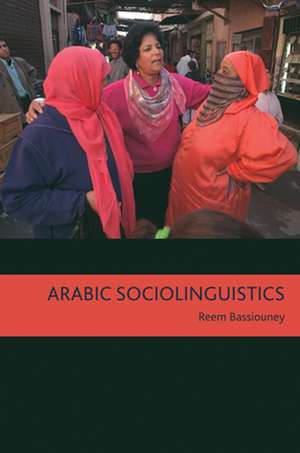Arabic Sociolinguistics: Topics in Diglossia, Gender, Identity, and Politics
Autor Reem Bassiouneyen Limba Engleză Paperback – 30 noi 2009 – vârsta de la 22 ani
Graduate students of Arabic language and linguistics as well as students of sociolinguistics with no knowledge of Arabic will find this volume to be an indispensable resource.
Preț: 315.95 lei
Nou
Puncte Express: 474
Preț estimativ în valută:
60.46€ • 63.29$ • 50.02£
60.46€ • 63.29$ • 50.02£
Carte tipărită la comandă
Livrare economică 05-19 aprilie
Preluare comenzi: 021 569.72.76
Specificații
ISBN-13: 9781589015739
ISBN-10: 1589015738
Pagini: 311
Dimensiuni: 155 x 231 x 18 mm
Greutate: 0.5 kg
Editura: Georgetown University Press
ISBN-10: 1589015738
Pagini: 311
Dimensiuni: 155 x 231 x 18 mm
Greutate: 0.5 kg
Editura: Georgetown University Press
Recenzii
"While there exist a number of undergraduate and graduate textbooks on the sociolinguistics of English, the current book focusing specifically on Arabic is to the best of my knowledge the first of its kind. Up-to-date and comprehensive, it is useful not only to students and researchers of Arabic, but also to all those who are interested in sociolinguistics in general." -- Language Policy "For those interested in the Arab situation from a sociolinguistic point of view, it seems indispensable. The enthusiasm of the author and the abundant and insightful examples make this a good book to be discovered by readers of traditional introductions into sociolinguistics, which, so this book demonstrates, have as their point of departure a western way of looking at things." -- Historical Sociolinguistics and Sociohistorical Linguistics
Notă biografică
Reem Bassiouney is an assistant professor of Arabic linguistics at Georgetown University. She is the author of The Functions of Code-Switching in Egypt as well as numerous scholarly articles and three novels.
Cuprins
Introduction 1. Diglossia and dialect groups in the Arab world1.1 Diglossia1.1.1 An overview of the study of diglossia1.1.2 Theories that explain diglossia in terms of levels1.1.3 The idea of Educated Spoken Arabic1.2 Dialects/varieties in the Arab world1.2.1 The concept of prestige as different from that of standard1.2.2 Groups of dialects in the Arab world 1.3 Conclusion 2. Code-switching2.1 Introduction2.2 Problem of terminology: code-switching and code-mixing2.3 Code-switching and diglossia2.4 The study of constraints on code-switching in relation to the Arab world2.4.1 Structural constraints on classic code-switching2.4.2 Structural constraints on diglossic switching2.4.2.1 Application of the ML and 4-M mdoel to MSA and ECA switching, a case study2.5 Motivations for code-switching2.5.1 Motivations and discourse functions of classic code-switching2.5.2 Motivations and discourse functions of diglossic switching2.6 Conclusion 3. Language variation and change3.1 Introduction3.2 Language variation and change3.2.1 Social class approach3.2.2 Social networks approach3.2.3 Third wave approach to variation studies: community of practice3.3 Methodology3.4 Sociolinguistic variables3.4.1 Ethnicity3.4.2 Religion3.4.3 Urbanisation3.4.4 Social class3.4.5 Other factors3.5 Levelling3.5.1 Diglossia and levelling3.5.2 Levelling and change3.6 Conclusion 4. Arabic and gender4.1 Introduction4.2 Approaches to language and gender4.2.1 The deficit theory and Lakoff's contribution to the study of language and gender4.2.2 The dominance theory4.2.3 The difference theory4.2.4 Third wave aproach to variation studies: community of practice theory4.3 Women in the Arab world: framing and background information4.3.1 Diversity in education4.3.2 Diveristy in urbanization4.3.3 Economic diversity4.3.4 Diversity in tradition and religious practices4.3.4.1 The veil4.3.5 Honour and modesty4.4 Politeness in relation to gender4.5 'Mister master': names, status and identities4.5.1 Names and why they are hidden4.6 When a chicken crows like a cock: women narrators4.7 Language variation and change in relation to gender4.7.1 An overview of studies on linguistic variation in relation to gender4.7.2 An overview of linguistic variation in relation to gender in the Arab world4.8 Projection of identity in the speech of educated women and men in Egypt: evidence from talk shows -- a case study4.8.1 Description of data4.8.2 Categorising the data4.8.3 Detailed description of the data4.8.4 Conclusion4.9 The symbolic use of language4.10 Gender universals re-examined4.11 Conclusion 5. Language policy and politics5.1 The power of language5.2 What is language policy?5.2.1 Language ideologies5.2.2 Language practices5.2.3 Language planning 5.3 Nation and state5.3.1 The relation between nations and language5.3.2 The Arab nation5.4 Countries with SA as the official language5.5 French versus British patterns of colonization and their relation to language policies5.5.1 French patterns of colonization5.5.2 British patterns of colonization5.6 Language policies in other parts of the Arab world5.7 The role of language academies in the Arab world5.8 SA, politics and the aching nation: a case study5.9 Linguistic rights and political rights5.10 English and globalization5.11 Conclusion General conclusion




